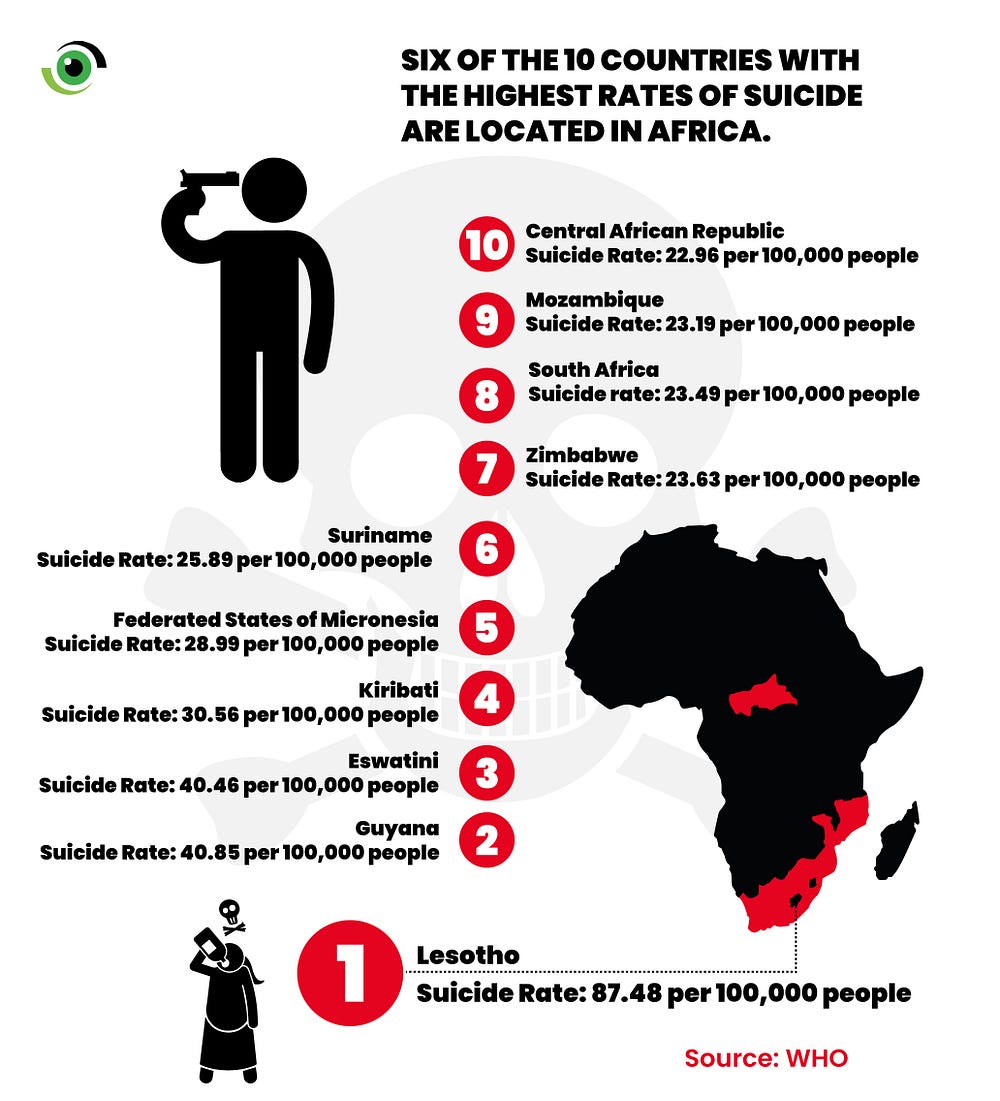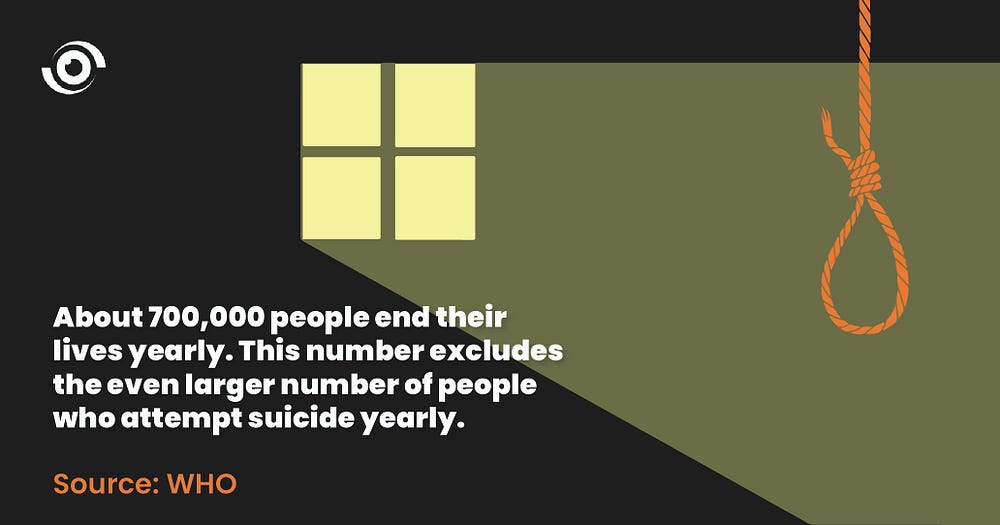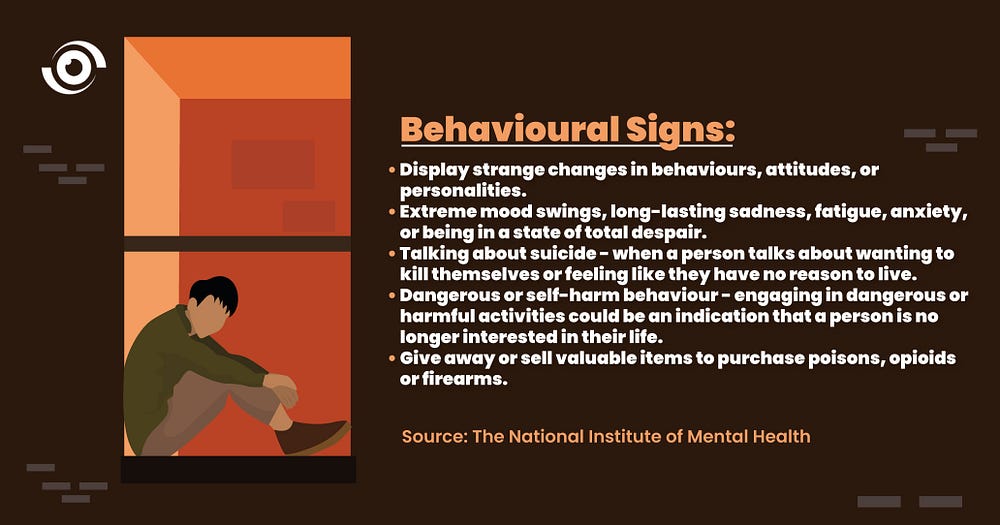Kenneth Ibe and Samuel Gada (Lead Writers)
In a video that went viral on social media recently, a Lagos socialite known as Mrs Salome* parked her SUV on the ever-busy Third Mainland Bridge in Lagos State and made an apparent attempt to jump into the lagoon. Fortunately, swift intervention from passers-by prevented her attempted suicide. However, not everyone is so fortunate. This was the case for Chukwuemeka Akachi, a fourth-year student at the University of Nigeria Nsukka (UNN), who took his own life in 2019, leaving behind a suicide note on his Facebook wall.
Here lies the question on everyone’s mind- Why did they do it?
Suicide is a highly complex phenomenon that has dire consequences on families, communities, and countries. Although it may be difficult to comprehend why someone would want to hurt themselves, suicide is among one of the leading causes of death worldwide.
People of different ages commit suicide; however, the rates are higher amongst vulnerable groups who experience mental health disorders (in particular, depression). People who are commonly discriminated against, and people who experience conflict, disaster, violence, abuse, or loss and a sense of isolation may attempt suicide.

While it cannot be linked to one particular cause, suicide is a serious public health challenge that is preventable with timely and often low-cost interventions.
Creating Hope Through Action
Every year on September 10th , World Suicide Prevention Day is commemorated. The purpose is to create awareness about suicide, how to recognise the warning signs, and how we all play a part in preventing suicide globally. The triennial theme (2021–2023) “Creating Hope Through Action” calls us to identify warning signs and act toward suicide prevention.
Approximately 700,000 people commit suicide annually. This number excludes the even larger number of people who attempt suicide yearly. According to the World Health Organisation (WHO), there are at least 20 unsuccessful attempts for every completed suicide. In Nigeria, the age-standardised suicide rate was 6.9 per 100,000 population in 2019, across both sexes, however, male suicide rates were higher at 10.1 per 100,000 population. Meanwhile, Lesotho has the highest suicide rate in Africa at 87.5 per 100,000 population in 2019.
The theme “Creating Hope Through Action” emphasises the role of hope in suicide prevention for individuals who are struggling with mental health issues, those who feel helpless and isolated, and those who “just want it to end”.

Suicide Prevention and Control Efforts in Nigeria
In Nigeria, the issue of suicide prevention has not received the attention it deserves. There are insufficient sensitisation exercises where suicide is presented as a significant public health concern. Under-reporting and lack of more detailed data also remains a problem in developing a strategy for suicide prevention in Nigeria, as a substantial number of suicide cases go unreported or are inaccurately documented, due to cultural stigmatisation and social taboos surrounding the phenomenon. Many families and communities still conceal suicide-related incidents, leading to an incomplete understanding of the scope of the problem.
The Mental Health Act 2021 signed into law by former President Muhammadu Buhari in 2023, seeks to enhance and protect the lives of people suffering from mental illnesses by increasing access to mental health care. However, the act does not adequately outline preventive strategies for suicide in Nigeria. The Government needs to develop a strategy that sets out the national ambitions for suicide prevention and the collective steps to take to achieve them. This should include individuals, organisations across national and state governments and the private sector.
Addressing the risk factors
Suicide is not inevitable, but it is preventable, and every person has a role to play. To reduce the incidence of suicide in Nigeria, knowing the warning signs to look out for is important.

Suicide prevention should be everyone’s business, however, the process of addressing risk factors linked to suicide can be stalled by several challenges. Stigma and taboos, especially concerning mental disorders and suicide, deter many at-risk individuals from seeking assistance.
Nigeria Needs a Suicide Prevention Strategy
On this World Suicide Prevention Day, it is essential to recognise that suicide is a global issue that affects people of all ages, genders, and backgrounds. In Nigeria, while significant challenges exist, there is hope.
However, there is much work to be done. Solution mechanisms should focus on early identification of at-risk individuals, implementation of proper reportage for suicide and attempted suicide cases and encouraging communities to actively participate in suicide prevention. These mechanisms should also focus on integrating mental health services into primary healthcare, improving knowledge of healthcare workers to provide necessary support and improving awareness on suicide.
Most importantly, a suicide prevention strategy that sets out priority areas for action to tackle challenges and reduce suicide rates needs to be developed. By working together, individuals, communities, and the government can reduce the prevalence of suicide and provide hope for a brighter future for all Nigerians.
Suicidal thoughts can affect anyone, do you know anyone struggling with suicidal thoughts or in need of mental health services? Helplines and crisis intervention services are available to provide immediate support to individuals in distress. Please contact 0800 800 2000.
*Not her real name


